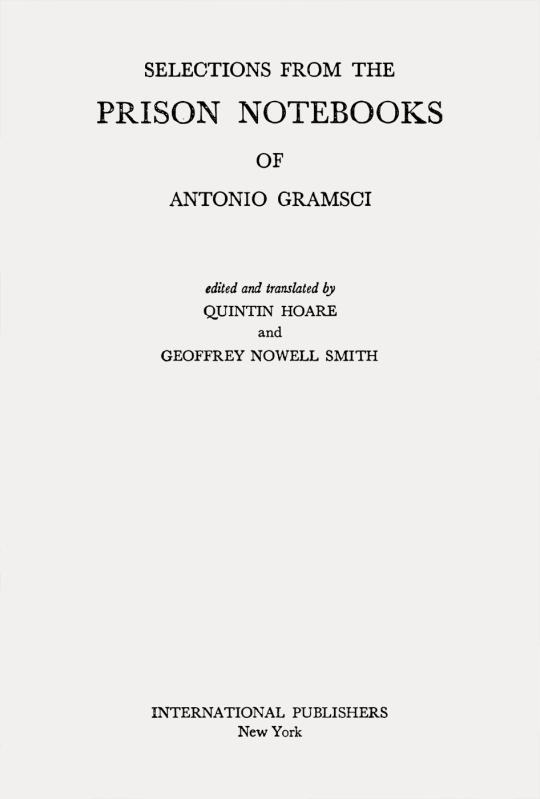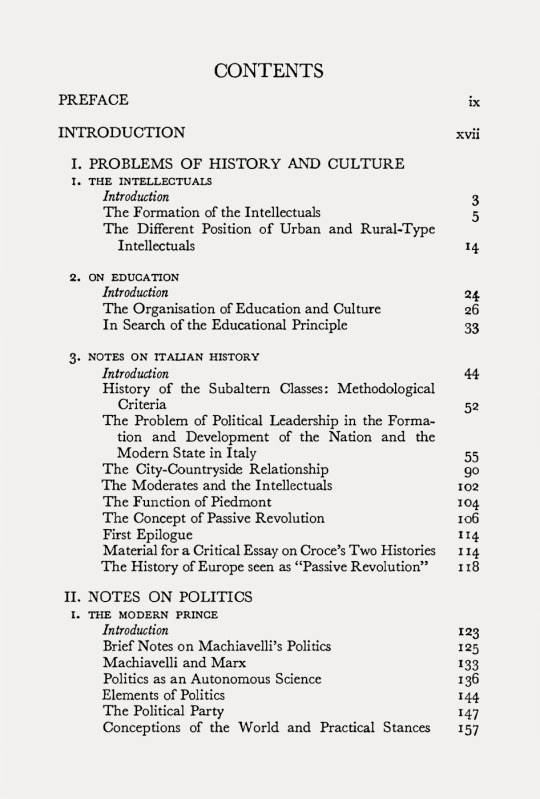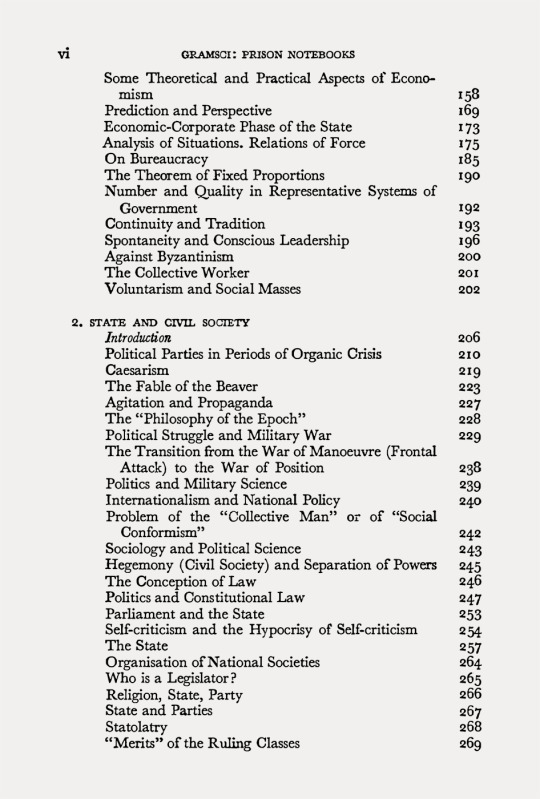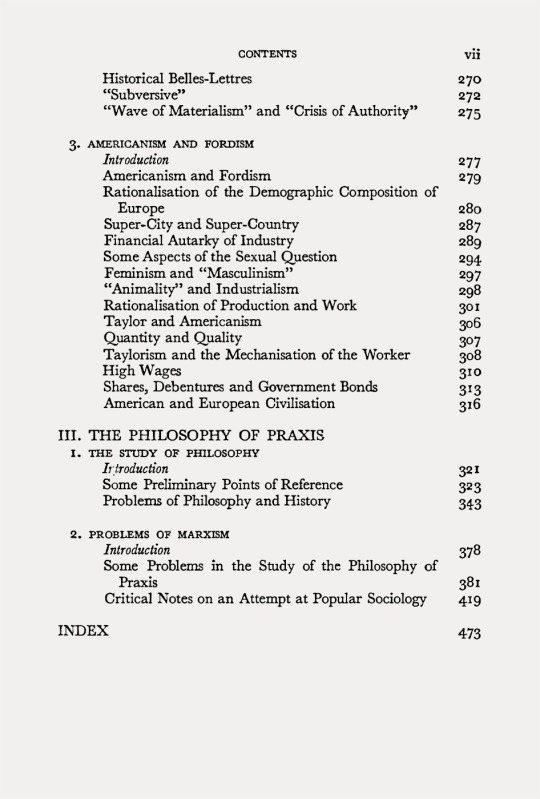#quintin hoare
Text

Antonio Gramsci, (1948-1951), Selections from the Prison Notebooks, Edited and translated by Quintin Hoare and Geoffrey Nowell Smith, International Publishers, New York, NY, (1971-)1992




#graphic design#philosophy#book#cover#book cover#antonio gramsci#quintin hoare#geoffrey nowell smith#international publishers#1940s#1950s#1970s#1990s
20 notes
·
View notes
Text
“If the ruling class has lost its consensus, i.e., is no longer leading but only dominant, exercising coercive force alone, this means precisely that the great masses have become detached from their traditional ideologies and no longer believe what they used to believe previously, etc. The crisis consists precisely in the fact that the old is dying and the new cannot be born. In this interregnum, a great variety of morbid symptoms appear.”
Antonio Gramsci, Quaderni del Carcere, vol. 1, Quaderni 1–5 (Turin: Giulio Einaudi editore, 1977), 311. English translation quoted from Selections from the Prison Notebooks of Antonio Gramsci, ed. and trans. Quintin Hoare and Geoffrey Nowell-Smith (London: Lawrence & Wishart, 1971), 276. In the Italian original, Gramsci says fenomeni morbosi, literally “morbid phenomena.”
#quotes#antonio gramsci#gramsci#the prison notebooks#interregnum#the old is dying#the new cannot be born
173 notes
·
View notes
Quote
I’m quite peaceful as you can see, dear little being. It seems to me too as though we were talking, when I write to you or especially when I receive a letter — it makes me feel close, so close. From time to time I look at your photos, and then I’m tempted to feel sad. But I feel so joined to you that I haven’t yet realized I won’t see you for a long while. I love you, my beloved, I cover your eyes, your cheeks, your whole dear face with kisses.
Simone de Beauvoir (1908-1986), in a letter to Jean-Paul Sartre (1905-1980), Paris, dated Sunday, September 10, 1939, in: “Letters To Sartre”, translated from the French by Quintin Hoare
167 notes
·
View notes
Text
Theory to the Masses!
Everybody is an intellectual, but not everybody can have a function of an intellectual in the society, noted Marxist thinker Antonio Gramsci in his famous Prison Notebooks (essays written between 1929 and 1935).* While everyone is capable of critical reflection, only some manage to become professionals and educational system, according to Gramsci, favors the middle and upper class (i.e. those pre-educated within family whose learned abilities are falsely represented as talent).
Celia Lury also briefly engages with feminist discontent with theory, but notes that “relationship between experience and theory had been opened up” (34). I certainly don’t think that academia is only (or even proper) home for radical theory, but I think that Gramsci was correct (and, if we consider the rising cost of higher education and precarious condition faces by early-career researches from underprivileged backgrounds, visionary) when he described the exclusivity of formal education. Queer theory, as a field often accused of obscurity, demands a lot from the reader and I feel that we have to ask is a class privilege one of those demands.
The answer proposed by slam poet and activist Lauren Zuniga in “Confessions of an Uneducated Queer” is “yes”. And also “no”. The opening line of the poem is “I can’t really understand Judith Butler” and following reference to the author’s inability to pronounce “Foucault” suggest that foundational texts of queer theory alienate uneducated queers. However, closing strophe in which the author lists all unconventional types of learning and unlikely heroes of queer culture such as anarchists who learn from the zines, sheltered suburban kids who only have Tumblr, and “folks who can’t read but still subvert the dominant paradigm on the daily” ends with following verse: “this is for the queer theorists – thank you”.
I do believe that theory can be liberatory, and I really like Lury’s stance on merging social and cultural factors in feminist research. And I like theory (even though I, like Zuniga, don’t understand Judith Butler at times)! In The Queer Art of Failure, Jack Halberstam proposes that we should uncouple learning from academia and use knowledges gained through (higher) education to challenge oppressive structures of (neoliberal) educational system. His idea is an excellent example of closing the gap between theory and experience.
Gramsci, Antonio. Selections from the Prison Notebooks. Translated by Quintin Hoare and Geoffrey Nowell Smith New York: International Publishers, 1992.
Lury, Celia. 1995. "The Rights and Wrongs of Culture: Issues of Theory and Methodology." In Feminist Cultural Theory: Process and Production, edited by Beverly Skeggs, 33-45. Manchester: Manchester University Press.
Halberstam, Judith [Jack]. The Queer Art of Failure. Duke University Press: Durham and London, 2011.
*The exact quote is “all men are intellectuals …” (9) but I am willing to give Gramsci the benefit of the doubt because he mentions that meritocracy-based and publicly-funded education should be available to both men and women.
4 notes
·
View notes
Text
“Goodbye, my love, I’ll write to you tomorrow. I love you quite passionately — and with a touch of tragedy — poor little prisoner, all out of reach. Till Tuesday, my love. We’ll spend a huge evening, perhaps we won’t go to bed all night, if the weather’s still as fine. I kiss your dear little face all over. I love you, my beloved.
Excerpt From
Letters To Sartre
Quintin Hoare
This material may be protected by copyright.
#poetry#quotes#poetry poems#poems on tumblr#poets on tumblr#poems#prose poetry#spilled poetry#spilled ink#spilled thoughts
2 notes
·
View notes
Text
Saturday, 23 March [1940]
“Grener, an Alsatian smelter with communist sympathies : 'It isn't going to last a hundred years.'
I: 'No. But it can still go on a long time.
He : 'Oh, the lads don't really feel up to that !'
I: 'So what? If any of them complain, they'll be stuck up against a wall, like in ' 17.'
He : 'I wouldn't say that - not right away. But you'll see ! On their side as much as on ours.'
I : 'On their side . . . '
He : 'The only thing is, they're kept more tightly under control than us. But don't you worry ! If the shit starts flying on our side, it'll fly on theirs too. This business can't go on.'
Just as many little things are happening to me as in December, and I 've got just as many ideas. But I've less stomach for recording them. This notebook will die of lethargy, unless there's some change in my life.
Renard : the event of his life - though he doesn't seem to realize it - is a change of surroundings. He passes from the 'hartistic' milieu of the Goncourts to the milieu of the theatre : Rostand, Capus, T. Bernard, Guitry. He needs Guitry's warmth to live. His whole life is resumed in this passage from Schwob to Guitry. Preferred friendship to love out of prudence and a relic of the homosexual sentimentalism of his youth.
The terrifying life of J . Renard. His journal is not so much an exercise in lucid severity, as a little corner of shamefaced, tender complicity with himself. It counterbalances the domestic silences of M. Lepic. He's unbuttoned there - but it doesn't seem that way, since his style's in white tie and tails.
The passage from the Goncourts' diary confirming what I was saying about Renard's generation : '27 August '70. Zola came to lunch today. He spoke to me about a series of novels which he wants to write, an epic in ten volumes called The Natural and Social History of a Family . . . He said to me : "After the analysis of the smaller subtleties of feeling, such as Flaubert did in Madame Bovary, after the analysis of things artistic, plastic and neurotic such as you have done, after these jewelled works, those chiselled volumes, there is no room for the young, nothing for them to do, no characters left for them to conceive and construct: It is only by the bulk of their work, the power of their creation, that they can appeal to the public. "
All right. But after the ten-volume epics? What's left? It's at this moment that Renard appears : Renard, the tag-end of that literature which goes from Flaubert to Maupassant by way of the Goncourts and Zola. A dying man. He has been dying all his life. And yet, it's he who had most influence on the entire postwar literature.
I swear it's truly staggering - when one's like me and sees all paths free for writing and thinking, all to be started anew, so that each time one chooses one has the impression one's lopping off a thousand virgin possibilities - it's truly astonishing to read that journal by a fellow who, on every page, asserts that all roads are blocked and originality can be achieved only through the sweat of one's brow.”
- Jean-Paul Sartre, “Notebook 14.” War Diaries: Notebooks from a Phoney War, 1939-1940. Translated by Quintin Hoare. Verso: 1985, 1999. p. 353-354.
#jean paul sartre#war diaries#diaries#phoney war#world war II#behind the lines#parti communiste français#smelter#metallo#working class#artillerymen#jules renard#goncourts#émile zola#literature#french literature#literary scene#gustave flaubert#total war#notebooks from a phoney war
1 note
·
View note
Text
Book Review: Letters To Sartre
Book Review: Letters To Sartre
Letters To Sartre, by Simone De Beauvoir, translated and edited by Quintin Hoare
I am perhaps the wrong person to be reading a book like this. Generally speaking, one reads the letters of others when one has an interest in them or their lives. I am, at best, deeply ambivalent to hostile towards the thinking of the author, and I am not that much more fond of Sartre outside of his excellent…
View On WordPress
1 note
·
View note
Text
「谎言」、意识形态和意识形态斗争
(原发豆瓣,2019年8月20日)
*注:这并不是一篇站在「后真相时代」的立场上对当下的意识形态斗争进行批评的文章。
「高举意识形态大旗的煽动家擅长利用谎言来对其追随者进行洗脑。被洗脑的人会失去批判性思维,失去明辨是非的能力,变成没有思想、只会高喊意识形态口号的复读机。」在各种不同语言、不同语境的政治讨论里,这个想法似乎深入人心,只不过参与讨论的任何一方往往都认为对方才是意识形态谎言的受害者。谎言和意识形态密切相关这个判断不难理解。如果我们认为从古至今,政治中就不缺少谎言,例如当权者往往利用谎言来控制民意,那么意识形态作为一种政治中的常见语言,就很可能是政客或者政治煽动家制止民众了解真相的工具。这种思路,在冷战结束前后的东欧颇有影响力(见推荐阅读1)。在这种思路的主导下,和意识形态洗脑作斗争的方式主要是揭露真相。真相因此带有启蒙教育的意义,因为它能指导意识形态的受害者识破谎言,从而反抗政治压迫。
可是这种策略中在实践中的一个不良后果是,一旦「被启蒙者」在看到「启蒙者」呈现的真相之后仍没有迅速改变自己的看法,启蒙者就很容易把被启蒙者看作失去了「人」之身份的人。毕竟,如果意识形态的核心是谎言与欺骗,那在真相被呈现之后,还执迷于谎言的人,要么是狂热非理性的信徒,要么就是蓄意利用谎言的谋取其他利益的野心家。公共政治讨论一旦进行到这一步,就出现了降格为人身攻击的风险,哪怕是最小限度上的理解也难以达成。
实际上,我们有足够的资源来重新考虑谎言在意识形态中的作用。谎言未必是意识形态的核心,这个判断
1. 不意味着谎言在意识形态宣传中不存在;
2. 不意味着没有煽动家利用谎言来挑唆大众;
3. 不意味着存在一部分人因为尚未获悉真相而受到蒙蔽;
4. 不意味着所有人都可以通过有效的意识形态斗争手段来说服;
5. 不意味着真相没有任何启蒙式的、教育的、思想解放式的作用;
6. 不意味着使用谎言进行意识形态宣传的煽动者没有道德责任。
但这个判断意味着,谎言也许是意识形态的重要部分,甚至有可能在种种意识形态中都多多少少存在,但「谎言 vs. 真相」的对立不是理解和处理意识形态斗争的核心手段。相反,更应该关心的是,意识形态宣传是如何把谎言和部分真相,以及部分悬而未决的半事实相结合,通过什么样的春秋笔法,编织出一套对服务于其说教目的的叙事的。这种叙事,除了利用刻意的谎言、部分真相和部分悬而未决的半事实之外,还针对性地调用了目标群体的哪些政治常识、哪些情绪和哪些共同记忆。这样看来,意识形态就不是一条由种种谎言串联而成的连贯的线条,而是一个由谎言、事实、常识、情感和记忆拼接而成的块状物。由于它是拼接而成的,它势必存在内在的不一致。这种不一致使意识形态能够在一定范围内有弹性地拉伸延展出去,解释新的事件,吸纳新的情��和立场。与此同时,拉伸和延展也会带来矛盾和冲突的危机。意识形态斗争的参与者,应该尝试去穿透意识形态看似一致的表面,找到它内在的分歧,攻击这些分歧。
对于学院训练出身的公共讨论参与者来说,这点尤其重要。学院训练的一部分,是以说理和论辩为基础的思维训练。与这种训练相比,意识形态的追随者所提出来的论点可能理论水平不高,所举出来的事实可能经不起严格的考究。但这不意味着更「高水平」的论辩、更受史学界推崇的共识就能启蒙这些追随者,也不意味着在更「高水平」的论辩、更受史学界推崇的共识被呈现出来之后,仍然拒绝接受这些理论和史实的追随者就要么是无可救药的、不理性的狂徒,要么心怀别有用心的恶毒。这甚至说明不了学术带来的共识是天然正确的,如果学者对学术本身的局限性稍微有一点反思的话。这无非是说明,纯粹立足在说理和呈现一些相反事实的基础上,是攻击不到意识形态的痛点的,甚至有时候还可能因为说理者居高临下的姿态激化矛盾。这同时要求参与在公共讨论中,试图挑战某一种意识形态的斗争者,以足够的同理心来理解自己的对手,哪怕这些对手最初在自己眼中是恶的、是荒谬的、是不可理喻的。
这很难。但觉得意识形态的斗争只要学者出来说理和呈现事实即可,恐怕更为荒谬。
推荐阅读
(1)意识形态的概念嬗变,以及学术界研究意识形态的方法的变化:
Freeden, Michael. "Ideology and Political Theory." Journal of Political Ideologies 11.1 (2006): 3-22.
(2)把 「谎言」作为意识形态核心构件,把 「真相」作为抵抗意识形态的主要武器的论述:
Havel, Vaclav, and Paul Wilson. "The Power of the Powerless." International Journal of Politics 15.3/4 (1985): 23-96.
(3)上述概念的一种实际应用:
Hui, Po-Keung, and Kin-Chi Lau. "“Living in truth” versus Realpolitik: Limitations and Potentials of the Umbrella Movement." Inter-Asia Cultural Studies 16.3 (2015): 348-366.
(4)谎言与政治:
Arendt, Hannah. "Lying in Politics." in Hannah Arendt, Crises of the Republic: Lying in Politics, Civil Disobedience on Violence, Thoughts on Politics, and Revolution, Harcourt, 1972: 1-48.
(5)将国家权力主导的 「仪式」和 「实践」理解成意识形态核心构件的论述:
Althusser, Louis. "Ideology and Ideological State Apparatuses," in Louis Althusser, On Ideology, Verso, 2008: 1-60.
(6)把 「常识化、政治化的通俗历史和通俗哲学」理解成理解成意识形态核心构件的论述:
Gramsci, Antonio. Selections from the Prison Notebooks. Quintin Hoare and Geoffrey Smith (eds.), International Publishers, 2004: 343-351, 375-377.
0 notes
Photo

When looking up the definition for the word “hegemony” one will find something along the lines of “leadership or dominance, especially by one country or social group over others.” Upon hearing this definition, I thought of the way that a government may govern its people or how a strong military can have power over that of a smaller country that they are invading. In my analysis of said word, I found that this is also something that is present in the current day in terms of what we are exposed to on a regular basis through the media. This is not only referring to what we are shown through the news, but also in our use of social media and similar platforms. Most of us are not able to realize how much power we give to those in high positions in the media to control our lives until we analyze the position that we are in and how much the media has contributed to our ways of thinking and the things that we think about regularly. This is a form of hegemony in the present day.
As we watch the news, it is likely that we will see headlines that go along the lines of “homeless Black man beat merchant for money” or “people rioting in Chicago for Black Lives Matter Movement.” Although both of these headlines are things that happen in our current society, why is it that we only see these kinds of things being shoved into our minds and we are not educated on topics such as the fact that there are also people who come from a higher socioeconomic backgrounds that are committing things such as white-collar crimes? This all may be tracing back to the initial idea of what hegemony is. According to Gramsci, control over a social order, or hegemony, can be attained through two ways: domination and intellectual or moral leadership (Lecture, 2/2/18). We can see this in the media as the executive giants and those with a big following on social media platforms are both able to dominate the masses through what they decide to show us and how it will help maintain their power status.
The reason that the media may decide to show us—the masses—these certain topics rather than others may be due to the fact that the people who are in control of the media are also considered to be a part of the same high socioeconomic class that these—for example, white-collar—crimes are being done. It is in the best interest of these high profile media executives to not show the masses what people like them may be doing. Most of these executives, having millions of dollars to their names, are for the idea of Capitalism and depriving the masses of certain knowledge helps further their agendas. Capitalism in turn also helps further hegemony since it maintains the power that there is amongst one group and does not allow for others to take that power away. One way that these people are able to maintain their power is by convincing the masses, most of which are not of notable income, that it is our own people who are disturbing the peace in society. We are made to believe that the people who have more wealth and power than us are only trying to help put a stop to all of the bad and law-breaking things that are currently happening in our own societies and also globally. According to Gramsci, “a class is dominant in two ways, ‘leading’ and ‘dominant.’ It leads the classes which are its allies, and dominates those which are its enemies” (57). We have come to this point in hegemonic culture due to those in power in the media gaining followers within their own social group and now dominating the masses through what they believe we should see.
This is not only happening in areas such as the major news sources, but also through what we see daily on social media. For example, many of us have decided to keep up with the lives of social media “influencers” because we want to see what they think is relevant and because their lifestyles or thoughts may appear attractive to us. Although it may not seem trivial as we click the “follow” button, taking a step back to analyze the hegemonic society that we live in it is clear that we are being controlled through this. It is a simple exchange; we contribute to their ever-growing social media following based solely on initial interest and they grow more famous, powerful, and wealthy in return. At this point, they have dominated our thoughts and chosen for us what we should deem important. It becomes easier for the masses to become focused on things such as the latest trends and gossip rather than the vital issues that are simultaneously happening around us. As mentioned in lecture, through Gramsci’s thoughts, we are allowing for these people in power to dominate us through consent (Lecture, 2/2/18). They are not forcing their content into our minds, we are the ones who have chosen to follow them and therefore take in what they want us to see.
One of the most important details to note when talking about hegemony is that it is not only leadership, but also dominance. These two words have very different meanings from one another. When speaking about leadership, we may be referring to someone, or a group, who is charismatic and promoting certain ideas to those who are following them. This person could also be the voice of the entire group and shares the ideals of the group with others in order to further and more effectively spread their message. On the other hand, our definition of someone who is attempting to assert dominance is very different. The definition for this word has a bit more of a negative and aggressive connotation and could also be referring to something that is taking on a more selfish approach. This does not only have to be done by one individual but could also be referring to a group who all has the same secret agenda and has members work with one another in order to help execute it properly and, therefore, have dominance over the subordinate group.
This is what I believe is happening in the media of our own country in the present day. Behind everything that we are shown through the media, there is a motive. Considering these executives are of such high profiles and would like to further expand their monetary returns, I highly doubt that their eagerness to inform the public of what is occurring in society comes from a place where they truly want to make sure that the public remains informed about the current events of the world. If this were the case, the coverage on all issues would we proportional to what is happening. There would not only be an emphasis on the negative things that underprivileged people do, but also on the crimes that important politicians and businesspeople commit. A piece that is also vital in the success of hegemony is alienation. As mentioned in lecture, alienation “suggests separation, distance, disconnection and estrangement” (Lecture, 2/9/18). In order for there to continue being control over a social order there has to first be an alienation of the subordinate group. The people who are in power do this through ensuring that the control is kept in their hands and that those who do not have as much of a voice feel as though it is pointless to attempt to build one because it is near impossible.
This is not only the case for the media within the United States of America, but I believe the same can also be said about media all across the entire globe. The people who are at the very top of the economic ladder for these countries are all trying to make sure that their own views are seen as universally true and that the views of those with less money are seen as subpar and not relevant. In order for this to finally change, the people would have to notice what is being done to them through the media. Once the people do this, there is no way that the media giants can continue to convince us that our own thoughts and ideals align with theirs because we will no longer accept them as things that should unquestionably be considered truth. The end to hegemony through the media starts with the masses no longer being compliant and now beginning to be eager to obtain knowledge that they believe is true to their own interests and vital in our current world.
Works Cited
Anderson, James. Lecture. 2/2/18. “Hegemony”.
Anderson, James. Lecture. 2/9/18. “Alienation”.
Gramsci, Antonio, Quintin Hoare, and Geoffrey Nowell-Smith. Selections from the Prison Notebooks of Antonio Gramsci. New York: International Publishers, 1971. Print.
0 notes
Quote
I love you so passionately. I’m sorry, I haven’t been as sweet as I should. But I kiss your sweet self, and your darling, lovely little face.
Simone de Beauvoir (1908-1986), in a letter to Jean-Paul Sartre (1905-1980)
[probably early 1937 ]
in “Letters To Sartre”, translated by Quintin Hoare
216 notes
·
View notes
Text
Saturday, 16 March [1940]
“Went back to the Rose this morning. In November there was a charming little waitress called Jeannette - red-haired, stupid, always half-asleep. I liked watching her. Now she has fluffed up her hair, paints her face, wears a dress tucked up high and says 'Punaise!' (a division from the Midi preceded us here). Alice, the fat brunette who used to sleep with all and sundry, makes a noisy entrance at past eight. She's wearing a black fur coat and reeks of perfume. married a soldier. Naudin, who has had her, sniggers and says : 'Being a cuckold has its advantages! '
Odd, none too agreeable impression - at once of return to the fold and of strangeness. The soldiers are received here with open arms - every Jack finds his Jill, or the people he's lodging with, who'd be shedding tears of emotion -but the game is played without me: no one recognizes me and I don't rediscover any old acquaintances. Except the fat old lady from the Rose, who clasped my hand warmly.
What I do rediscover are the creakings of the door at night in the dark, echoing schoolhouse. They all had a mysterious, familiar meaning, like a promise of remembrance. And there's a bygone atmosphere in this schoolhouse, which I cannot enlarge upon but which is everywhere present. People say we shan't be staying more than a week, and this makes me somewhat concerned about my leave. This morning, for the first time for ages, I find the time dragging.
Albert Ollivier: La Commune, p. 221:
'Liberalism is the right way of ensuring liberty, the Commune had to learn that to its cost . . . Tolerance is often merely an opportunism which is unwilling to speak its name.'
Excellent comment in L 'Oeuvre:
'Among the bad slogans spawned by war, one of the most exasperating is the famous catchphrase : "Time is working for us." 'People say this with a knowing or a smug look, accompanied by a wink. For two pins they'd add : "Time is working : let it alone, we mustn't disturb it!"
'How do they fail to realize that this is the best way of encouraging indolence, lack of imagination and lack of initiative?
'Is time really working for us, when Sweden and Norway pass over from the camp of the democracies to that of Hitler? -
'Is time really working for us, when the heroic people of Finland must suffer the Russo-German diktat?'
And this comment by Deat : 'The nickel and iron have now been secured by Germany; the Scandinavian countries are becoming the clients of Stalin and above all of Hitler. Tomorrow the fjords will doubtless shelter German submarines, until such time as airbases can be established on those tame lands . . . We have just lost the Scandinavian countries. If we go on in this way, we shall finish losing the Balkans likewise. One of two things: either we manoeuvre in military style on the flanks, since a thrust in the centre is wisely ruled out - in which case we make use of the flanks while there's still time.
Or else we admit there no longer are any flanks, and that all operations are precluded. In that case, it's a different war that we have to wage. No less arduous; no less dangerous ; no less total. But it requires a different diplomacy, a different economic organization, a different morale, a different propaganda and different methods of government. '
Chaumeix (Paris-Soir): 'For England and France it's an undeniable reverse.'
Our first defeat. Here, it's met with a kind of indifference. People say : 'Now the war will last ten years.'
- Jean-Paul Sartre, “Notebook 14.” War Diaries: Notebooks from a Phoney War, 1939-1940. Translated by Quintin Hoare. Verso: 1985, 1999. p. 340-343
#jean paul sartre#war diaries#diaries#phoney war#world war II#behind the lines#home front#military leave#norwegian campaign#campagne de Norvège#operation weserübung#total war#blitzkrieg#notebooks from a phoney war
0 notes
Text
教育系统,意识形态斗争的战场
(原载政见CNPolitics,2016年12月4日)
从小到大接受了这么多年教育的你,脑海中或许闪现过这样的问题:教育究竟是什么?教育的功能和意义是什么?
问题的答案,自然是多种多样:教育是传授知识和技能的过程、教育给予寒门子弟向上流动的机会、教育强化了阶级特权亦或是加剧了阶级固化……但同样不可忽视的是,教育系统还是对青少年进行意识形态灌输的渠道,而这种意识形态灌输,在很多时候是为国家权力、统治阶级以及特定的经济生产方式服务的,维持并强化了一整套压迫关系。
那么,如何理解作为意识形态灌输渠道的教育呢?在教育系统这个领域内,是否存在被压迫阶级进行反抗的空间?在马克思主义传统中,两位伟大的理论家——意大利人安东尼奥·葛兰西(Antonia Gramsci)和法国人路易·阿尔都塞(Louis Althusser)——曾对这些问题进行过深入讨论。虽然他们两人对教育和意识形态的论述有明显不同,阿尔都塞更是视葛兰西为批评的对象,但从根本上说,两人的观点彼此照应、相得益彰,为我们理解教育领域的意识形态斗争提供了极为宝贵的启发。
作为意识形态国家机器的教育系统
在那篇著名的《意识形态和意识形态国家机器》中,阿尔都塞提出,资本主义社会的再生产远不止于生产资料的再生产,它同时也包括了生产关系的再生产。生产关系的再生产,有赖于意识形态国家机器(Ideological State Apparatuses, ISAs)。与主要依靠暴力的镇压性国家机器(Repressive State Apparatus, RSA)不同,意识形态国家机器主要通过意识形态灌输的方式生产、再生产了一代又一代新的工人阶级和资产阶级。在前资本主义时代,主要承担意识形态灌输功能的是教会,而在现代社会,意识形态国家机器的主导形式是义务教育。
阿尔都塞说:
“沿途被赶出来的每一批人,实际上都被提供了与他们在阶级社会必须充当的角色相适应的意识形态:被剥削者的角色需要“高度发达的”“职业的”、“伦理的”、“公民的”、“民族的”和非政治的意识;剥削的当事人的角色需要一种向工人发号施令和对他们讲话的“人际关系”的能力,镇压的当事人的角色需要有发号施令和强迫“无条件”服从的能力,或是玩弄政治领袖的修辞术进行煽动的能力),而职业的意识形态家的角色则需要一种带着尊重(即带着恰如其分的轻蔑、敲诈和煽动)去影响人们意识的能力,以大谈道德、德性、“超越”、民族和法国的世界地位之类的论调。”
某种程度上,阿尔都塞的意识形态教育理论带有鲜明的结构主义决定论色彩:人在年少时光中度过了漫长的学校生涯,在这一阶段, 意识形态所发挥的“同化/自然化”(naturalization)作用,使人们难以察觉到资本主义赖以生存的种种条件是如何被生产、再生产出来的。
意识形态国家机器能被挑战吗?
依照阿尔都塞的理论,我们自然要问:如果我们(包括阿尔都塞本人)都深陷于意识形态教育之中,这个教育系统能被挑战吗?我们如何“逃离”意识形态教育? 阿尔都塞本人已经指出,作为意识形态灌输手段的教育系统,正在受到挑战:
“因此,当世界范围的阶级斗争已经威胁到这种生产方式的存在的时候,空前深刻的危机目前正动摇着全球许多国家的教育制度,并时常伴随着(《共产党宣言》早已宣告过的)动摇家庭制度的危机,因而呈现出它的政治意义。”
这里我们需要澄清几个问题。
第一,如上所述,意识形态国家机器和镇压性国家机器之间的一个重要区别是,前者的运行主要有赖于意识形态灌输、而后者有赖于暴力(当然,两者并不完全互斥)。既然意识形态国家机器主要不是暴力性的,那么我们有理由认为,受压迫阶级可以在意识形态国家机器中找到一些意识形态斗争的空间、挑战这一机器本身。因此,用阿尔都塞本人的话说:
“意识形态国家机器也许不只是阶级斗争(往往是表现出激烈形式的阶级斗争)的争夺对象,还是阶级斗争的场所。掌握政权的阶级(或阶级联盟)在意识形态国家机器中,不能像在(镇压性)国家机器中那样轻易地制���法律,这不仅是因为以往那些统治阶级能够在那里长时间地保持牢固的立场,而且也因为被剥削阶级的抵抗能够利用那里的矛盾,能够通过斗争攻克那里的战场,从而在那里找到表现自己的手段和机会。”
第二,按照阿尔都塞的意识形态理论,意识形态是存在于国家机器以及这种机器的实践中的,而这种实践是通过现实的行动(既所谓的“仪式”)来完成的。换句话说,阿尔都塞的这一套理论是非常“唯物”的。麦克菲尔(Ken MacPhail)总结道,“意识形态更多的是一种有生命的关系,而不是对现实的或真实或虚假的表现。”因此,教育之所以能起到意识形态灌输的作用,并非因为它触碰且改变了个人的意识(consciousness),而是因为它再生产了一系列每个人不得不参与的仪式,这些仪式构成了意识形态的实践。
葛兰西与阿尔都塞的异同
另一位著名的马克思主义理论家葛兰西同样深入讨论过意识形态和教育的问题。有趣的是,阿尔都塞一直把葛兰西当成自己的论敌。这样一来,我们不禁要问:阿尔都塞和葛兰西的意识形态理论有什么差异?这两套理论可以兼容吗?
在一些根本的问题上,阿尔都塞和葛兰西是有共识的。
比如,两人在讨论意识形态时,都反对严格的经济决定论。对于他们来说,意识形态不是经济基础的被动接受者,意识形态可以反作用于经济基础。
此外,对于阿尔都塞提出的“意识形态及其实践是为资本主义的再生产而服务的”这一观点,葛兰西也并不反对。在观察教育机构的变迁时,葛兰西指出,“[资本主义社会]创造了一整套不同级别的、专业化的学校系统,服务于整个职业化的产业系统,或者服务于已经专业化的、有明确界限的职业。”显然,葛兰西理解经济生产的资本化如何带来教育机构的专业化,也理解这一教育专业化的过程如何再生产出为资本主义经济模式下不同产业服务的个体 。
葛兰西似乎也有足够的理由赞同阿尔都塞的“意识形态国家机器(尤其是教育系统)是斗争的战场”这一论断。葛兰西认为,经济危机本身不能赋予工人阶级力量,更不能赋予他们战斗的精神。因此,葛兰西完全有理由认为,教育是工人阶级参与意识形态斗争的重要场域(这在葛兰西对教会的讨论中也体现得非常充分)。
但是,葛兰西的意识形态论述也有明显异于阿尔都塞之处。葛兰西认为,意识形态是“一套需要在历史中被检验的观念体系”。但是对于“唯物”的阿尔都塞而言,最根本上说, 意识形态并非观念,而是实践、仪式和意识形态机器。
这个差异,在两位作者讨论教师的作用时体现得非常明显。对于阿尔都塞而言,尽管一小部分教师可能会教育学生反抗意识形态——“他们算得上是一类英雄”——但是大部分教师却没有意识到,整个教育体系强加给他们的“工作”远比他们自身强大、甚至将他们碾压得粉碎。很多教师也没有意识到,学校作为一种制度的维系和发展,并不是一件自然而然的事;恰恰是资本主义体系的运作,为它蒙上了“自然而然”的表象,并使得学校的维系和发展在一代又一代的学生身上发挥了意识形态灌输的作用。
但葛兰西不这么看。葛兰西认为,教师们面对着两种意识形式之间的斗争:教师代表的意识和学生代表的意识。理想的、有能力的教师应该规范他的学生,使学生倾向于前一种意识、远离后一种意识,因为儿童的意识并不是个人独立的,而是反映了“儿童在市民社会中参与的环节,以及构成他们的家庭、邻居、村落等等的社会关系。”
与阿尔都塞相比,葛兰西明显对教师——作为一种反抗资本主义意识形态的能动个体(agency)——的角色更有信心。但同时,教师的能动性也取决于学校体系的结构。葛兰西指出,不同的学校系统适应于不同阶级的再生产需求:职业学校生产新一代的被压迫阶级,传统学校则生产新一代的统治阶级。
教育作为反压迫的武器:葛兰西的方案
基于这种理解,葛兰西指出,只有创造新形式的学校,才能让被压迫阶级有效地反抗现存教育系统和这一系统所承载的意识形态统治。如阿罗诺维茨(Stanley Aronowitz)所概括的,由于作为被压迫阶级的无产阶级和农民既不具备学习的时间、也不具备学习的文化先决条件,葛兰西提供了一条中间路线:“通过教育的方式,来培养一种特定的知识精英。”此处的“知识精英”概念,并不是普遍性的,而是立足于特定的社会阶级。作为革命阶级的无产阶级,需要培养属于他们自己的、为无产阶级的历史任务服务的知识精英。
葛兰西主张,在培育无产阶级知识精英的学校中,当学生在智识、道德、创造力和自主性上达到了一定程度的成熟之后,学校应该“致力于让青年男女加入到社会活动中去”。换句话说,葛兰西实际上支持在无产阶级知识精英的教育中加入实践性的活动——比如,在工厂或者农场里开展田野调查、与劳动者共享生活条件、参与无产阶级的日常工作。葛兰西对教育当中“实践”活动的强调,实际上呼应了阿尔都塞的“唯物”立场,将意识形态解释为仪式和实践。
站在阿尔都塞的角度,我们依然可以对葛兰西的主张提出一些疑问:反抗统治阶级意识形态的,究竟是实践所传递的理念,还是实践本身?在阿尔都塞所描述的严格结构化的社会里,无产阶级是不是真的有可能建立起独立的教育系统?但从根本上讲,葛兰西提出的“创造新的学校、为无产阶级培养知识精英”的方案,为阿尔都塞的诊断提供了有益的补充。正是在这一层面上,葛兰西和阿尔都塞这一对“论敌”达成了相得益彰的关系。
说明:本文中,全部阿尔都塞文本的翻译来自中文马克思主义文库(https://www.marxists.org/chinese/),其余英文文本为作者自行翻译。
参考文献
Althusser, Louis.(2009). For Marx. London: Verso.
Althusser, Louis.(2008). Ideology and ideological state apparatus. in On ideology, London: Verso.
Aronowitz, Stanley.(2002). Gramsci’s theory of education: Schooling and beyond. In Carmel Borg, Joseph Buttigieg and Peter Mayo(Eds.), Gramsci and education. New York: Rowman & Littlefield Publishers.
Gramsci, Antonio. Selections from the prison notebooks. Quintin Hoare and Geoffrey Nowell Smith (Eds.), New York: International Publishers, 2014.
MacPhail, Ken.(2001). The dialectic of accounting education: From role identity to ego identity. Critical Perspectives on Accounting 12, 471-499.
0 notes
Quote
My love, is it true I’m not going to see you for a long time ?.. Do write to me, dear little being — I love you. If I could only see you again, just for a few hours even . . . Have you got my letters ? Tell me how you felt when you received them, do talk to me — I’ll keep my peace of mind only if I can feel you really close... I kiss you with all my might, yourself, my happiness and my life.
Simone de Beauvoir (1908-1986), in a letter to Jean-Paul Sartre (1905-1980), Paris, dated Monday September 11, 1939, in: “Letters To Sartre”, translated from the French by Quintin Hoare
116 notes
·
View notes